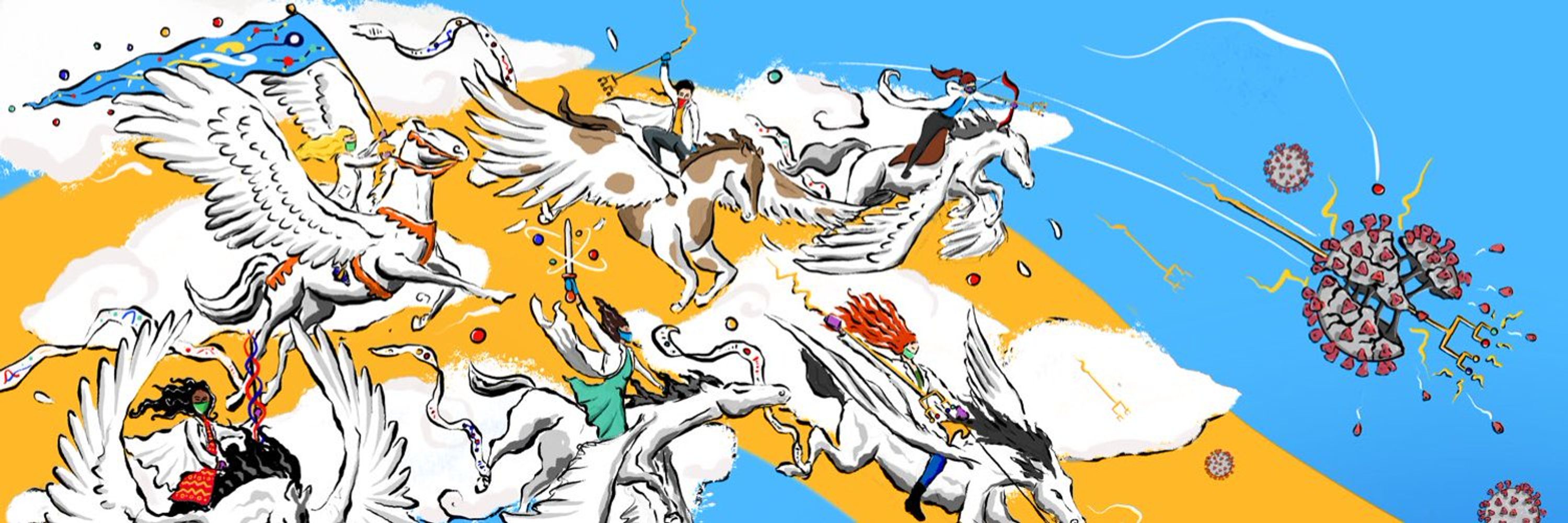
Alex Cagan
@atjcagan.bsky.social
Researching somatic evolution at the University of Cambridge and Wellcome Sanger Institute. Also a scientific illustrator.
Julie Ahringer from @gurdoninstitute.bsky.social @geneticscam.bsky.social @cam.ac.uk gives talk on decoding genome regulation during development. Exploring how chromatin accessibility changes throughout development enable single cells to become multicellular organisms.
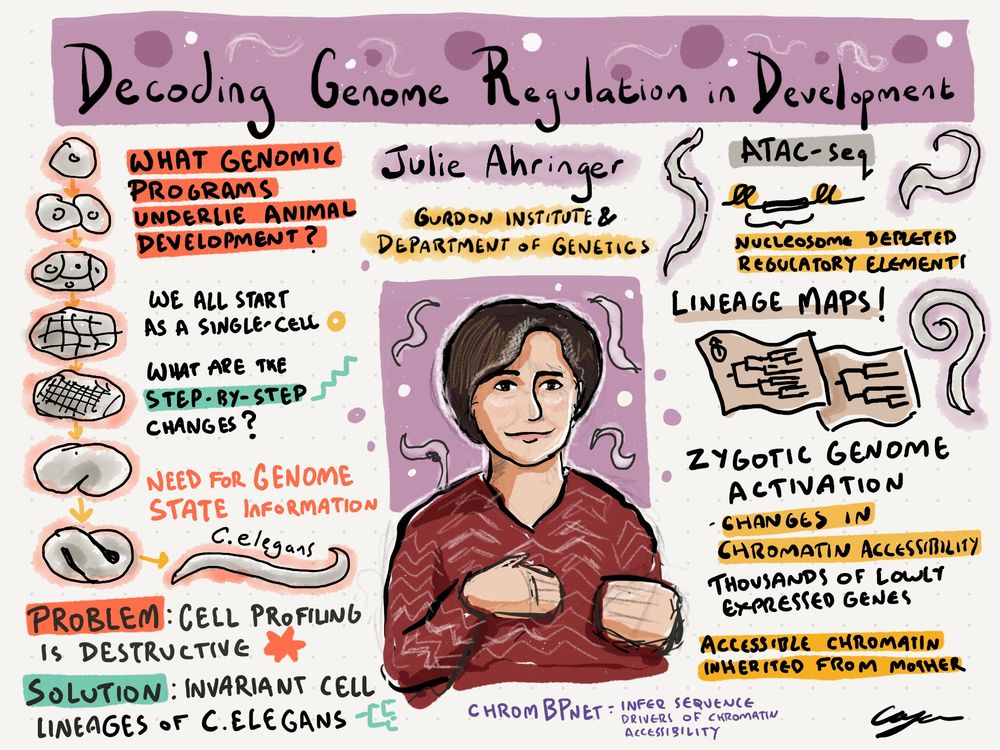
November 7, 2025 at 1:48 PM
Julie Ahringer from @gurdoninstitute.bsky.social @geneticscam.bsky.social @cam.ac.uk gives talk on decoding genome regulation during development. Exploring how chromatin accessibility changes throughout development enable single cells to become multicellular organisms.
This is a fantastic opportunity to do exciting research on comparative somatic evolutionary genomics as part of a great team. I've collaborated with Peter for many years and highly recommend this position! Please email Peter if you'd like to learn more, including a copy of your CV.
The Sudmant lab at UC Berkeley is seeking a postdoc to work on a fully funded NIH project to understand differences in DNA repair and somatic mutation across the primate tree of life. Please spread widely to those who may be interested aprecruit.berkeley.edu/JPF05052

Postdoctoral Scholar – Genomics, Aging, Somatic Mutation, Structural Variation, Evolution , Cancer – Integrative Biology
University of California, Berkeley is hiring. Apply now!
aprecruit.berkeley.edu
August 14, 2025 at 5:53 PM
This is a fantastic opportunity to do exciting research on comparative somatic evolutionary genomics as part of a great team. I've collaborated with Peter for many years and highly recommend this position! Please email Peter if you'd like to learn more, including a copy of your CV.
Reposted by Alex Cagan
Closing keynote from the fabulous @atjcagan.bsky.social on "The impossibility of whales" discussing somatic mutagenesis across species. Brilliantly delivered and exceptionally illustrated talk, as anyone who knows Alex's work would expect! #EBECancer25
@eventswcs.bsky.social
@eventswcs.bsky.social
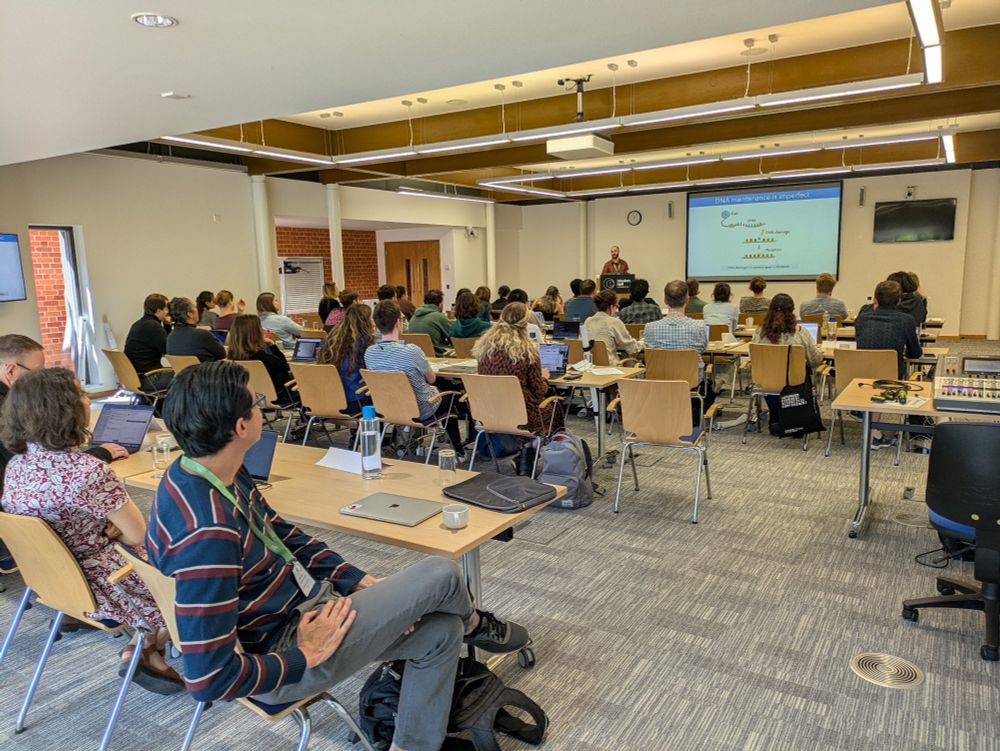
July 3, 2025 at 10:12 AM
Closing keynote from the fabulous @atjcagan.bsky.social on "The impossibility of whales" discussing somatic mutagenesis across species. Brilliantly delivered and exceptionally illustrated talk, as anyone who knows Alex's work would expect! #EBECancer25
@eventswcs.bsky.social
@eventswcs.bsky.social
Thanks @amyboddy.bsky.social for the invitation to run this workshop on where ideas come from in science, barriers to creativity and how to overcome them. Great discussion from the group! I'm a convert to 'night science' @urialonlab.bsky.social
Late night session on how to think of good ideas!! #EBECancer25 @atjcagan.bsky.social discusses the creativity in science & helped us practice different ways to think and talk about our science.


July 3, 2025 at 1:57 PM
Thanks @amyboddy.bsky.social for the invitation to run this workshop on where ideas come from in science, barriers to creativity and how to overcome them. Great discussion from the group! I'm a convert to 'night science' @urialonlab.bsky.social
Reposted by Alex Cagan
The Somatic Mosaicism across Human Tissues Network @nature.com @timcoorens.bsky.social
www.nature.com/articles/s41...
www.nature.com/articles/s41...

July 2, 2025 at 8:27 PM
The Somatic Mosaicism across Human Tissues Network @nature.com @timcoorens.bsky.social
www.nature.com/articles/s41...
www.nature.com/articles/s41...
Reposted by Alex Cagan
If you’ve ever wondered about the statistical significance of differences among mutational signature profiles, check out our new Aggregate Mutation Spectrum Distance (AMSD) preprint co-led by Sam Hart and @alisonfeder.bsky.social with @nalcala.bsky.social www.biorxiv.org/cgi/content/...
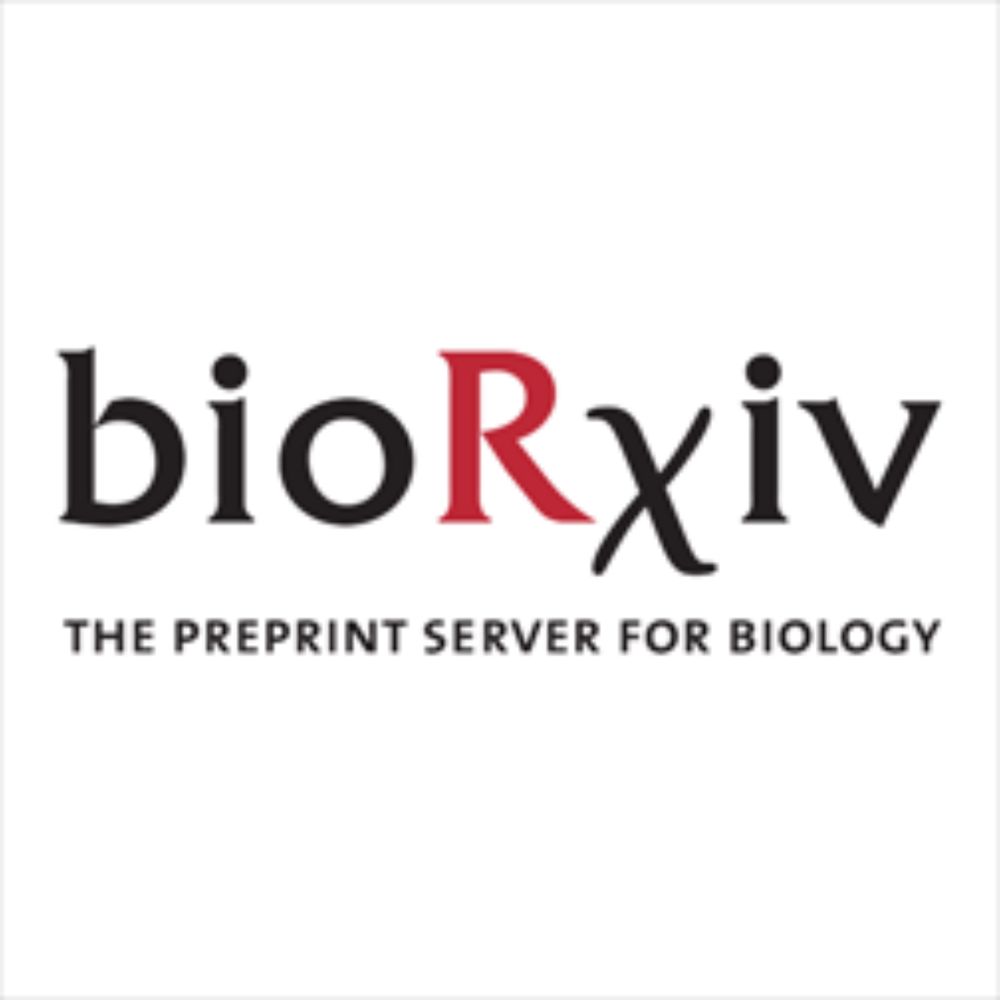
A signature-agnostic test for differences between tumor mutation spectra reveals carcinogen and ancestry effects
Mutational signatures contain valuable information about the mutational processes shaping cancer genomes. However, despite dozens of tools to identify signatures in cancer samples, there is not an est...
www.biorxiv.org
May 20, 2025 at 4:58 PM
If you’ve ever wondered about the statistical significance of differences among mutational signature profiles, check out our new Aggregate Mutation Spectrum Distance (AMSD) preprint co-led by Sam Hart and @alisonfeder.bsky.social with @nalcala.bsky.social www.biorxiv.org/cgi/content/...
A new review paper for those interested in how comparative approaches are informing cancer research. Advances in genomic resources for non-traditional model organisms (whales, bats, and beyond!) is set to transform our ability to gain insights from cancer resistant species.
doi.org/10.1038/s415...
doi.org/10.1038/s415...

Advancing cancer research via comparative oncology - Nature Reviews Cancer
Comparative oncology combines evolutionary biology, ecology, veterinary medicine and clinical oncology to better understand cancer, for example, by identifying the molecular and cellular mechanisms un...
doi.org
June 27, 2025 at 1:12 PM
A new review paper for those interested in how comparative approaches are informing cancer research. Advances in genomic resources for non-traditional model organisms (whales, bats, and beyond!) is set to transform our ability to gain insights from cancer resistant species.
doi.org/10.1038/s415...
doi.org/10.1038/s415...
New Review Paper! I usually study mutations caused by failures to repair DNA damage, but organisms also deliberately edit their own genomes. This review by Vincent, @sebastianevda.bsky.social and myself takes a look at 'How and when organisms edit their own genomes'
www.nature.com/articles/s41...
www.nature.com/articles/s41...

How and when organisms edit their own genomes - Nature Genetics
This Review describes the changes that some organisms make to their own DNA sequences, linking many to common genetic mechanisms built around canonical DNA repair and to a set of functional circumstan...
www.nature.com
June 27, 2025 at 12:42 PM
New Review Paper! I usually study mutations caused by failures to repair DNA damage, but organisms also deliberately edit their own genomes. This review by Vincent, @sebastianevda.bsky.social and myself takes a look at 'How and when organisms edit their own genomes'
www.nature.com/articles/s41...
www.nature.com/articles/s41...
Another great Sanger Sketcher to follow for summaries of research talks @isabellease.bsky.social
May 22, 2025 at 9:20 AM
Another great Sanger Sketcher to follow for summaries of research talks @isabellease.bsky.social
Reposted by Alex Cagan
Elegant new theory on polygenic adaptation by Will Milligan, Laura Heyward, and Guy Sella.
When should adaptation arise from a polygenic response versus few large effect changes? https://www.biorxiv.org/content/10.1101/2025.05.15.654234v1
May 17, 2025 at 11:55 PM
Elegant new theory on polygenic adaptation by Will Milligan, Laura Heyward, and Guy Sella.
Reposted by Alex Cagan
Thanks to everybody who chimed in!
I arrived at the conclusion that (1) there's a lot of interesting stuff about interactions and (2) the figure I was looking for does not exist.
So, I made it myself! Here's a simple illustration of how to control for confounding in interactions:>
I arrived at the conclusion that (1) there's a lot of interesting stuff about interactions and (2) the figure I was looking for does not exist.
So, I made it myself! Here's a simple illustration of how to control for confounding in interactions:>
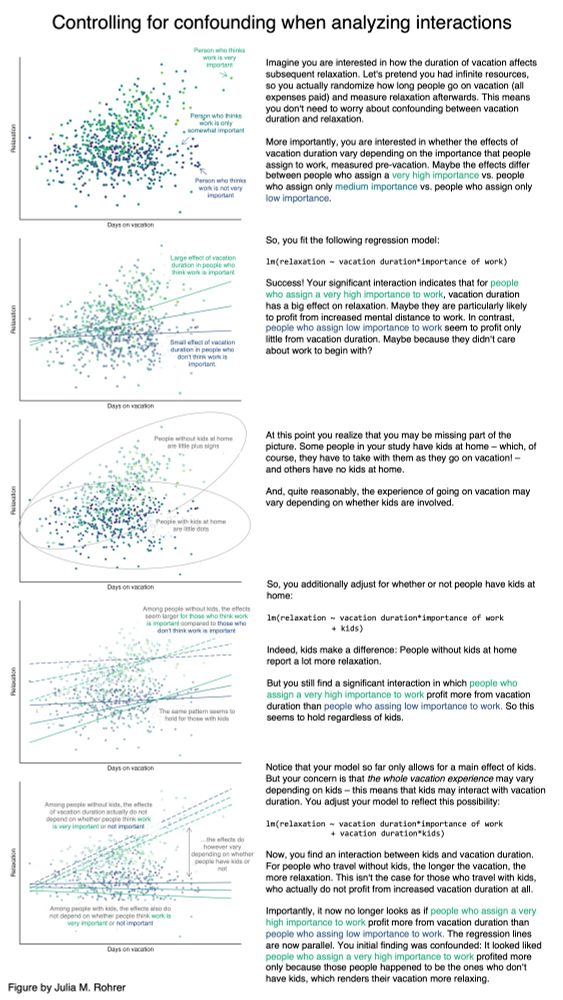
May 11, 2025 at 5:34 AM
Thanks to everybody who chimed in!
I arrived at the conclusion that (1) there's a lot of interesting stuff about interactions and (2) the figure I was looking for does not exist.
So, I made it myself! Here's a simple illustration of how to control for confounding in interactions:>
I arrived at the conclusion that (1) there's a lot of interesting stuff about interactions and (2) the figure I was looking for does not exist.
So, I made it myself! Here's a simple illustration of how to control for confounding in interactions:>
Had a lot of fun designing this special double issue cover on long reads with @genomeresearch.bsky.social
Last night of another great #BOG25! Thanks to everyone who came to chat with us at our Meet the Editors sessions. Had a great year putting together this special double issue! Now, on to the next! #somaticmosaicism @genomeresearch.bsky.social @cshlmeetings.bsky.social
May 10, 2025 at 6:56 AM
Had a lot of fun designing this special double issue cover on long reads with @genomeresearch.bsky.social
Reposted by Alex Cagan
“A rising wave of white nationalism in many parts of the globe could threaten the progress that has been made in science — and broader society — towards a more equitable world
As scientists and members of the public, we must push back against this threat”
🧪
www.nature.com/articles/d41...
As scientists and members of the public, we must push back against this threat”
🧪
www.nature.com/articles/d41...

Eugenics is on the rise again: human geneticists must take a stand
Scientists must push back against the threat of rising white nationalism and the dangerous and pseudoscientific ideas of eugenics.
www.nature.com
April 25, 2025 at 6:05 AM
“A rising wave of white nationalism in many parts of the globe could threaten the progress that has been made in science — and broader society — towards a more equitable world
As scientists and members of the public, we must push back against this threat”
🧪
www.nature.com/articles/d41...
As scientists and members of the public, we must push back against this threat”
🧪
www.nature.com/articles/d41...
Reposted by Alex Cagan
B͓̊å͓c͓̊t͓̊e͓̊r͓̊i͓̊å͓l͓̊ s͓̊ů͓g͓̊å͓r͓̊ f͓̊ů͓e͓̊l͓̊s͓̊
c͓̊å͓n͓̊c͓̊e͓̊r͓̊ r͓̊i͓̊s͓̊k͓̊
Study in 𝘕𝘢𝘵𝘶𝘳𝘦 finds ADP-HEPTOSE, a bacterial sugar produced by Gram- gut flora, leaks into the bloodstream with age, activating NF-κB, giving pre-leukaemic blood cells a growth edge, and triggering dangerous clonal haematopoiesis
Starczynowski Lab U Cincinnati
c͓̊å͓n͓̊c͓̊e͓̊r͓̊ r͓̊i͓̊s͓̊k͓̊
Study in 𝘕𝘢𝘵𝘶𝘳𝘦 finds ADP-HEPTOSE, a bacterial sugar produced by Gram- gut flora, leaks into the bloodstream with age, activating NF-κB, giving pre-leukaemic blood cells a growth edge, and triggering dangerous clonal haematopoiesis
Starczynowski Lab U Cincinnati
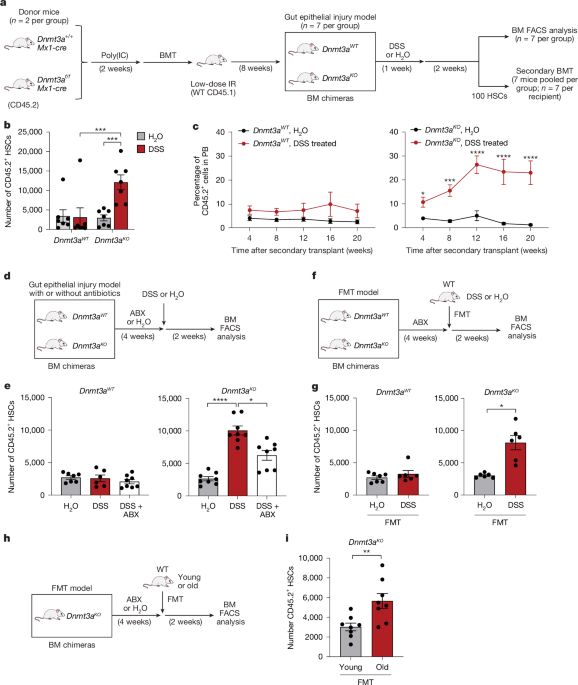
Microbial metabolite drives ageing-related clonal haematopoiesis via ALPK1 - Nature
ADP-heptose binds to ALPK1, triggering transcriptional reprogramming and NF-κB activation, endowing pre-leukaemic cells with a competitive advantage due to excessive clonal proliferation.
www.nature.com
April 27, 2025 at 4:05 PM
B͓̊å͓c͓̊t͓̊e͓̊r͓̊i͓̊å͓l͓̊ s͓̊ů͓g͓̊å͓r͓̊ f͓̊ů͓e͓̊l͓̊s͓̊
c͓̊å͓n͓̊c͓̊e͓̊r͓̊ r͓̊i͓̊s͓̊k͓̊
Study in 𝘕𝘢𝘵𝘶𝘳𝘦 finds ADP-HEPTOSE, a bacterial sugar produced by Gram- gut flora, leaks into the bloodstream with age, activating NF-κB, giving pre-leukaemic blood cells a growth edge, and triggering dangerous clonal haematopoiesis
Starczynowski Lab U Cincinnati
c͓̊å͓n͓̊c͓̊e͓̊r͓̊ r͓̊i͓̊s͓̊k͓̊
Study in 𝘕𝘢𝘵𝘶𝘳𝘦 finds ADP-HEPTOSE, a bacterial sugar produced by Gram- gut flora, leaks into the bloodstream with age, activating NF-κB, giving pre-leukaemic blood cells a growth edge, and triggering dangerous clonal haematopoiesis
Starczynowski Lab U Cincinnati
I had a great time working with @genomeresearch.bsky.social on these two covers that combine to form a single image for part 1 and 2 of their long-read sequencing special issues
Amos many thanks to the greatly talented @atjcagan.bsky.social for the cool cover art — part1&2 nicely matching!
Part 1 and 2 of the Long-read sequencing Special Issues are now live! tinyurl.com/Genome-Res-LRS
April 15, 2025 at 8:20 AM
I had a great time working with @genomeresearch.bsky.social on these two covers that combine to form a single image for part 1 and 2 of their long-read sequencing special issues
Reposted by Alex Cagan
The MIMIC lab is hiring a Postdoctoral Research Associate to join my team at @Cambridge_Uni!
Exploration and engineering DNA-mimicking proteins (wet-lab position.) 🧬
Details: www.jobs.cam.ac.uk/job/50652/
Please get in touch / circulate !
Exploration and engineering DNA-mimicking proteins (wet-lab position.) 🧬
Details: www.jobs.cam.ac.uk/job/50652/
Please get in touch / circulate !
Research Associate (Fixed Term) - Job Opportunities - University of Cambridge
Research Associate (Fixed Term) in the Department of Genetics at the University of Cambridge.
www.jobs.cam.ac.uk
March 22, 2025 at 3:54 PM
The MIMIC lab is hiring a Postdoctoral Research Associate to join my team at @Cambridge_Uni!
Exploration and engineering DNA-mimicking proteins (wet-lab position.) 🧬
Details: www.jobs.cam.ac.uk/job/50652/
Please get in touch / circulate !
Exploration and engineering DNA-mimicking proteins (wet-lab position.) 🧬
Details: www.jobs.cam.ac.uk/job/50652/
Please get in touch / circulate !
Reposted by Alex Cagan
Interested in a starting PI position at University College London to work on Genetics, Evolution or the Environment? My department has opened the call for expressions of interest for sponsorship of independent fellowship applications.
www.ucl.ac.uk/work-at-ucl/...
www.ucl.ac.uk/work-at-ucl/...

UCL – University College London
UCL is consistently ranked as one of the top ten universities in the world (QS World University Rankings 2010-2022) and is No.2 in the UK for research power (Research Excellence Framework 2021).
www.ucl.ac.uk
March 21, 2025 at 7:43 PM
Interested in a starting PI position at University College London to work on Genetics, Evolution or the Environment? My department has opened the call for expressions of interest for sponsorship of independent fellowship applications.
www.ucl.ac.uk/work-at-ucl/...
www.ucl.ac.uk/work-at-ucl/...
Reposted by Alex Cagan
Our paper on ancient human population structure is now published. We find that the ancestors of modern humans lived in multiple populations during the period when Homo sapiens evolved in Africa. www.nature.com/articles/s41...

A structured coalescent model reveals deep ancestral structure shared by all modern humans - Nature Genetics
The cobraa model extends the pairwise sequentially Markovian coalescent to identify structured population history by examination of the model transition matrix. Applied to human polymorphism data, cob...
www.nature.com
March 18, 2025 at 10:21 PM
Our paper on ancient human population structure is now published. We find that the ancestors of modern humans lived in multiple populations during the period when Homo sapiens evolved in Africa. www.nature.com/articles/s41...
An excellent postdoc opportunity with Adrian Baez-Ortega at the University of Cambridge on the genomics of transmissible cancer.
Adrian is a brilliant scientist and mentor, this is a fantastic opportunity I strongly recommend.
Adrian is a brilliant scientist and mentor, this is a fantastic opportunity I strongly recommend.
March 17, 2025 at 7:33 AM
An excellent postdoc opportunity with Adrian Baez-Ortega at the University of Cambridge on the genomics of transmissible cancer.
Adrian is a brilliant scientist and mentor, this is a fantastic opportunity I strongly recommend.
Adrian is a brilliant scientist and mentor, this is a fantastic opportunity I strongly recommend.
Talk by
@khmiga.bsky.social for the @sinaigenhealth.bsky.social Institute for Genomic Health Seminar Series on the potential of complete genomes and pangenomes for improving human health
@khmiga.bsky.social for the @sinaigenhealth.bsky.social Institute for Genomic Health Seminar Series on the potential of complete genomes and pangenomes for improving human health

February 23, 2025 at 1:26 PM
Talk by
@khmiga.bsky.social for the @sinaigenhealth.bsky.social Institute for Genomic Health Seminar Series on the potential of complete genomes and pangenomes for improving human health
@khmiga.bsky.social for the @sinaigenhealth.bsky.social Institute for Genomic Health Seminar Series on the potential of complete genomes and pangenomes for improving human health
Reposted by Alex Cagan
Why do some animals, like whales, live exceptionally long lives free from many age-related diseases? 🐋
Join @atjcagan.bsky.social to see how nature’s solutions to longevity may hold the key to tackling our own health challenges: www.festival.cam.ac.uk/events/impos...
Join @atjcagan.bsky.social to see how nature’s solutions to longevity may hold the key to tackling our own health challenges: www.festival.cam.ac.uk/events/impos...

February 20, 2025 at 2:22 PM
Why do some animals, like whales, live exceptionally long lives free from many age-related diseases? 🐋
Join @atjcagan.bsky.social to see how nature’s solutions to longevity may hold the key to tackling our own health challenges: www.festival.cam.ac.uk/events/impos...
Join @atjcagan.bsky.social to see how nature’s solutions to longevity may hold the key to tackling our own health challenges: www.festival.cam.ac.uk/events/impos...
Reposted by Alex Cagan
Come learn how to apply approaches in evo-eco to cancer biology 🧬 ✨
Working in #CancerBiology?
Join us at our expert-led #EBECancer25 course, to discover how insights on the #evolutionary and ecological aspects of #cancer are shaping the future for improved clinical treatments.💊
📅 30 June-3 July 2025
⏰Apply by 1 April!
📎bit.ly/40nLdDD
@sysbiocurie.bsky.social
Join us at our expert-led #EBECancer25 course, to discover how insights on the #evolutionary and ecological aspects of #cancer are shaping the future for improved clinical treatments.💊
📅 30 June-3 July 2025
⏰Apply by 1 April!
📎bit.ly/40nLdDD
@sysbiocurie.bsky.social

February 14, 2025 at 6:06 PM
Come learn how to apply approaches in evo-eco to cancer biology 🧬 ✨
Reposted by Alex Cagan
How would you expect somatic mutation rate to correlate with species longevity? Study in 2022 by @atjcagan.bsky.social etal in @nature.com discovered key patterns. Our model predicts some of these and highlights possible mechanisms driving co-evolutionary dynamics. www.biorxiv.org/content/10.1...
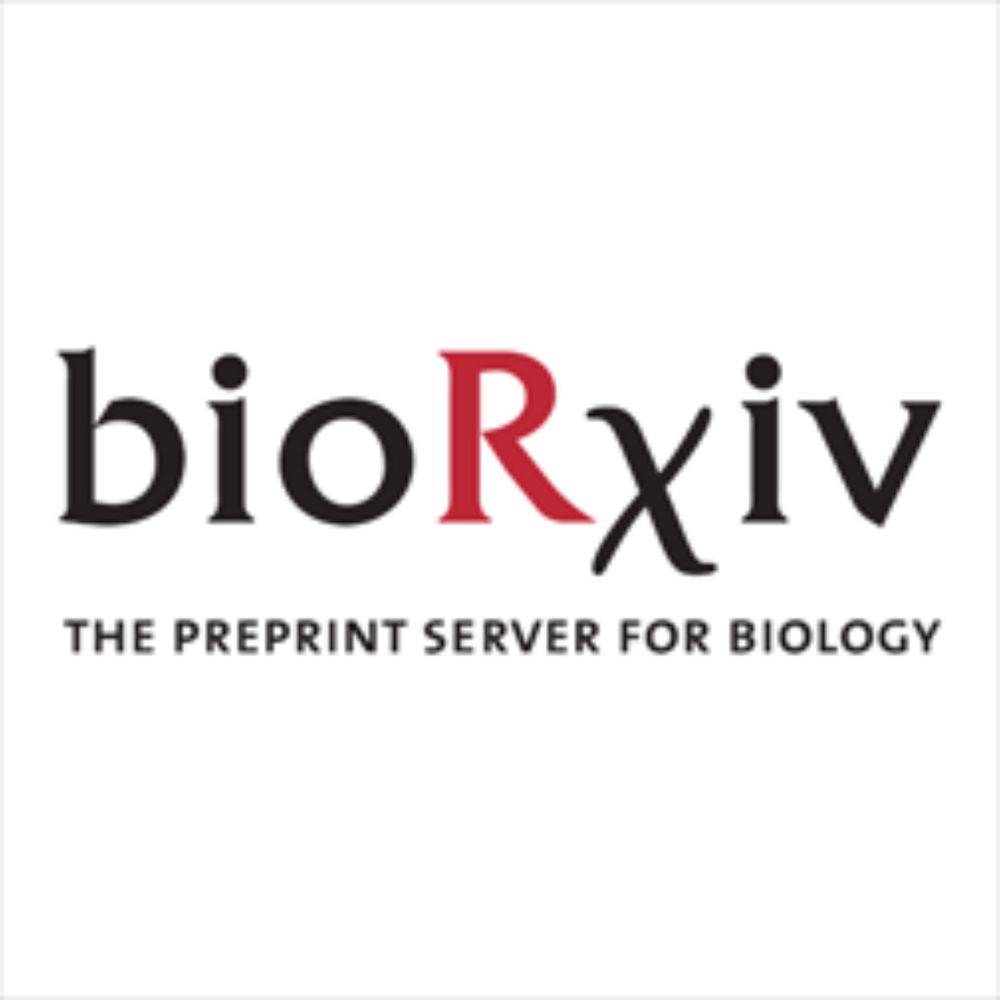
Disease as a mediator of somatic mutation-life history coevolution
Multicellular organisms are confronted not only with mutation in germline, but also mutations emerging in somatic cells. Somatic mutations can lead cancers and possibly contribute to aging phenotypes....
www.biorxiv.org
February 7, 2025 at 2:56 PM
How would you expect somatic mutation rate to correlate with species longevity? Study in 2022 by @atjcagan.bsky.social etal in @nature.com discovered key patterns. Our model predicts some of these and highlights possible mechanisms driving co-evolutionary dynamics. www.biorxiv.org/content/10.1...


